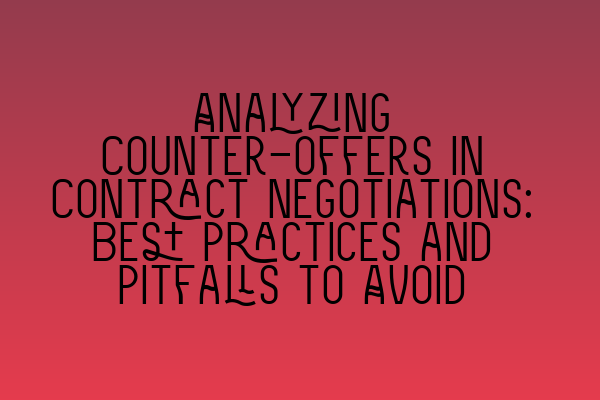title: Analyzing Counter-offers in Contract Negotiations: Best Practices and Pitfalls to Avoid
Introduction:
When it comes to contract negotiations, one of the key stages is analyzing counter-offers. This critical step can determine the success or failure of the negotiations. In this blog post, we will discuss the best practices to adopt and pitfalls to avoid when analyzing counter-offers in contract negotiations.
Understanding Counter-offers:
Before diving into the best practices, it is important to have a clear understanding of what a counter-offer is. Essentially, a counter-offer is a response to an initial offer made by one party during contract negotiations. It can take the form of amendments, modifications, or changes to the terms and conditions proposed by the other party.
Best Practices for Analyzing Counter-offers:
1. Thoroughly Review the Counter-offer:
When you receive a counter-offer, it is crucial to carefully review every aspect of it. This includes understanding the changes proposed, evaluating the impact on your original offer, and assessing the potential risks and benefits. Take your time to analyze the counter-offer, and don’t rush into a decision.
2. Identify and Prioritize Your Objectives:
Before analyzing the counter-offer, it is essential to identify and prioritize your objectives. What are the key terms and conditions that you are unwilling to compromise on? By having a clear understanding of your priorities, you can effectively evaluate the counter-offer and negotiate towards achieving your desired outcomes.
3. Seek Legal Advice:
Analyzing a counter-offer requires a deep understanding of contract law. It is highly recommended to seek legal advice from a solicitor who specializes in contract law. A legal expert can help you navigate through the complexities of the counter-offer, identify potential pitfalls, and provide valuable insights to protect your interests.
4. Assess the Financial Implications:
One of the critical aspects of analyzing a counter-offer is assessing the financial implications. Consider the financial aspects of the counter-offer, such as pricing, payment terms, and potential penalties. Determine whether the counter-offer is commercially viable and aligns with your financial goals. It may also be helpful to conduct market research or seek assistance from financial advisors to evaluate the counter-offer from a financial standpoint.
5. Evaluate the Legal Ramifications:
Contractual agreements often have legal ramifications. When analyzing a counter-offer, pay close attention to the legal implications it may have on your rights and obligations. Consider factors such as indemnity provisions, dispute resolution mechanisms, intellectual property rights, and any potential legal risks. Consulting with a solicitor will be invaluable in identifying and understanding the legal consequences of the counter-offer.
Pitfalls to Avoid:
1. Emotional Decision-making:
Contract negotiations can be emotionally charged, especially when it involves significant stakes or long-standing relationships. Avoid making decisions based solely on emotions. Instead, focus on the facts, legal implications, and commercial viability of the counter-offer.
2. Failure to Communicate Clearly:
Effective communication is vital during contract negotiations. Failing to clearly communicate your concerns, priorities, and expectations with the other party can lead to misunderstandings and failed negotiations. Maintain open and transparent lines of communication throughout the process.
3. Ignoring Red Flags:
Analyzing a counter-offer requires a keen eye for any red flags. These could be unfavorable terms, ambiguity, or contradictory clauses that may indicate potential challenges in the future. Identify and address these issues proactively to protect your interests.
Conclusion:
Analyzing counter-offers in contract negotiations is a crucial stage that requires careful consideration and expertise. By following the best practices outlined in this blog post, you can navigate through the complexities of counter-offers and negotiate effectively. Remember to seek legal advice, evaluate financial implications, and prioritize your objectives. Avoid common pitfalls such as emotional decision-making, poor communication, and ignoring red flags. Successful analysis of counter-offers can lead to favorable outcomes and strengthen your position in contract negotiations.
Related Articles:
– SQE 1 Practice Exam Questions
– SQE 1 Practice Mocks FLK1 FLK2
– SQE 2 Preparation Courses
– SQE 1 Preparation Courses
– SRA SQE Exam Dates
